Business and Management: Contemporary Development at Toyota
VerifiedAdded on 2021/02/19
|17
|5724
|102
Report
AI Summary
This report provides a comprehensive analysis of Toyota's business development and management strategies, focusing on the influence of the external environment through PESTLE analysis and Porter's Five Forces. It examines the impact of political, economic, social, technological, legal, and environmental factors on Toyota's operations, along with an assessment of supplier and buyer power, threats from new entrants and substitute products, and competitive rivalry. The report further investigates technological disruption and disruptive innovation within the automotive industry, evaluating the effectiveness of Toyota's responses and offering recommendations for improvement. The analysis highlights Toyota's market leadership in hybrid and hydrogen fuel cell vehicles, its global presence, and its commitment to environmental sustainability, while also addressing challenges posed by Brexit and evolving market dynamics.
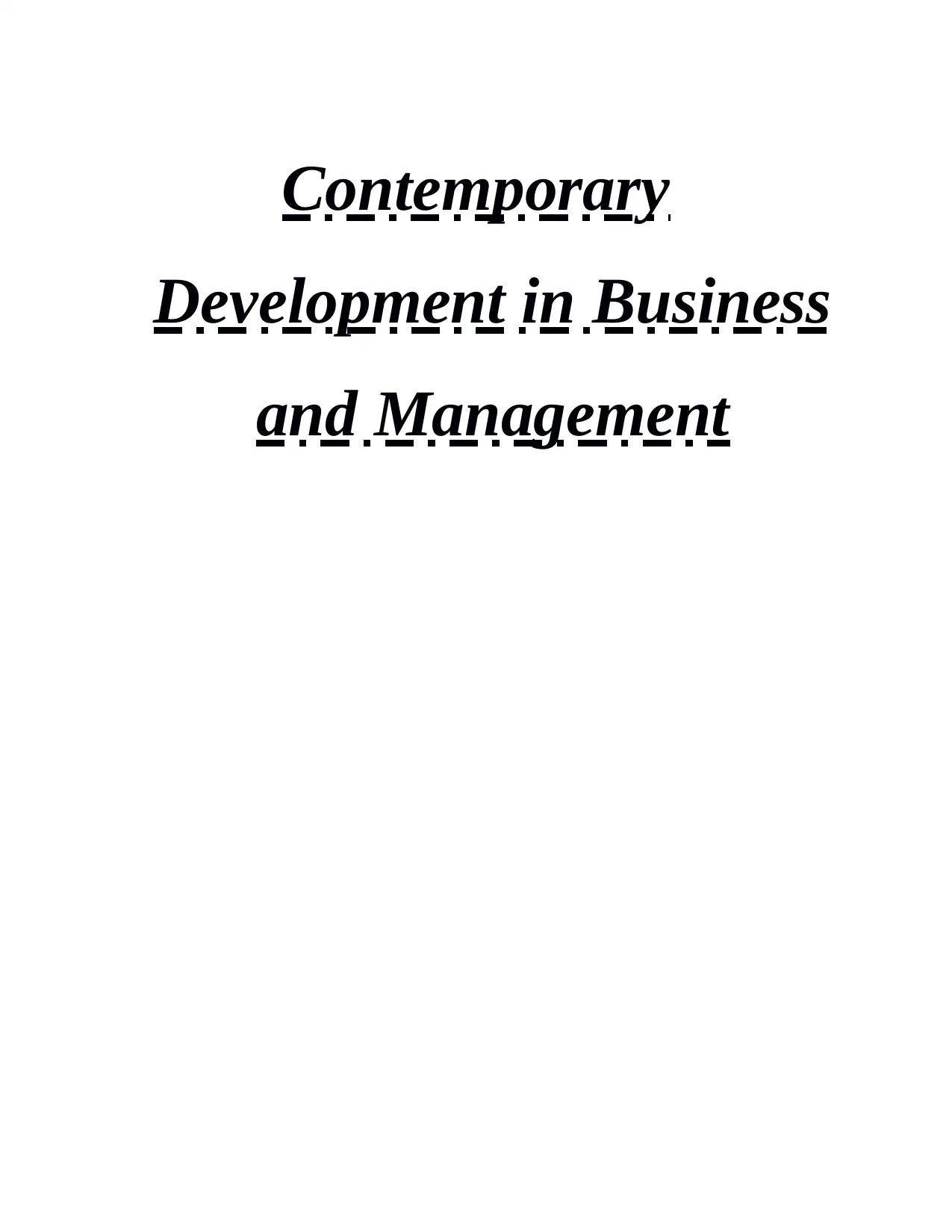
Contemporary
Development in Business
and Management
Development in Business
and Management
Paraphrase This Document
Need a fresh take? Get an instant paraphrase of this document with our AI Paraphraser
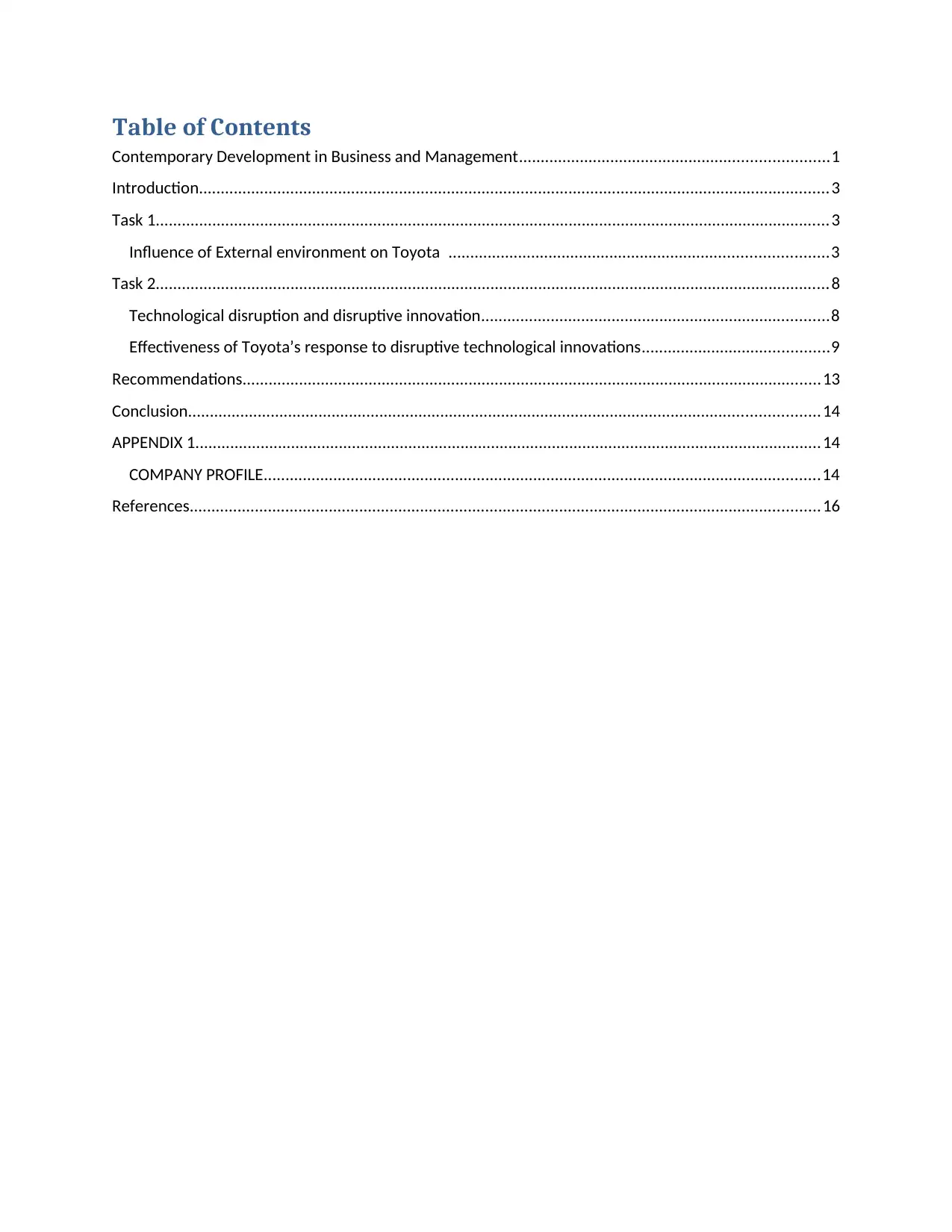
Table of Contents
Contemporary Development in Business and Management.......................................................................1
Introduction.................................................................................................................................................3
Task 1...........................................................................................................................................................3
Influence of External environment on Toyota .......................................................................................3
Task 2...........................................................................................................................................................8
Technological disruption and disruptive innovation................................................................................8
Effectiveness of Toyota’s response to disruptive technological innovations...........................................9
Recommendations.....................................................................................................................................13
Conclusion.................................................................................................................................................14
APPENDIX 1................................................................................................................................................14
COMPANY PROFILE................................................................................................................................14
References.................................................................................................................................................16
Contemporary Development in Business and Management.......................................................................1
Introduction.................................................................................................................................................3
Task 1...........................................................................................................................................................3
Influence of External environment on Toyota .......................................................................................3
Task 2...........................................................................................................................................................8
Technological disruption and disruptive innovation................................................................................8
Effectiveness of Toyota’s response to disruptive technological innovations...........................................9
Recommendations.....................................................................................................................................13
Conclusion.................................................................................................................................................14
APPENDIX 1................................................................................................................................................14
COMPANY PROFILE................................................................................................................................14
References.................................................................................................................................................16
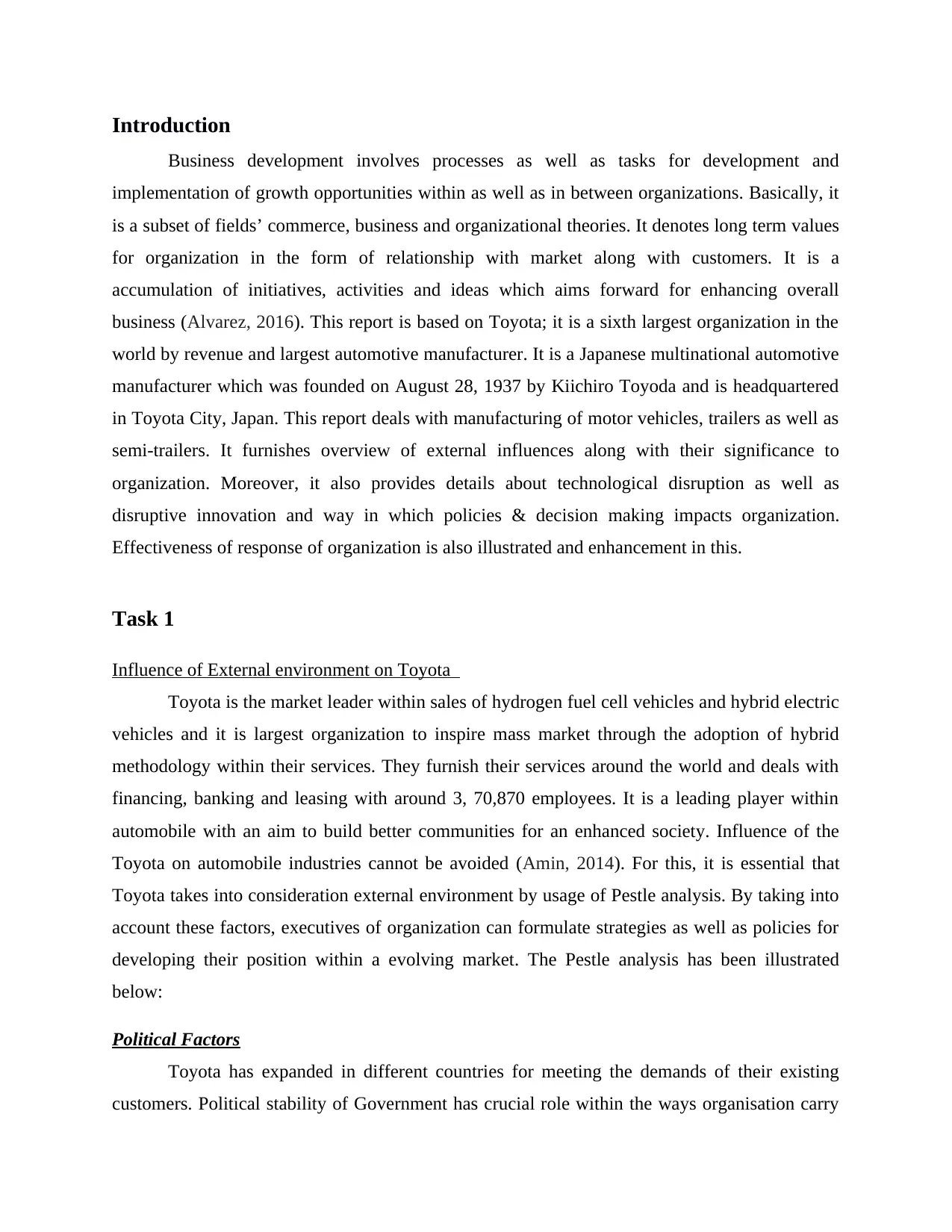
Introduction
Business development involves processes as well as tasks for development and
implementation of growth opportunities within as well as in between organizations. Basically, it
is a subset of fields’ commerce, business and organizational theories. It denotes long term values
for organization in the form of relationship with market along with customers. It is a
accumulation of initiatives, activities and ideas which aims forward for enhancing overall
business (Alvarez, 2016). This report is based on Toyota; it is a sixth largest organization in the
world by revenue and largest automotive manufacturer. It is a Japanese multinational automotive
manufacturer which was founded on August 28, 1937 by Kiichiro Toyoda and is headquartered
in Toyota City, Japan. This report deals with manufacturing of motor vehicles, trailers as well as
semi-trailers. It furnishes overview of external influences along with their significance to
organization. Moreover, it also provides details about technological disruption as well as
disruptive innovation and way in which policies & decision making impacts organization.
Effectiveness of response of organization is also illustrated and enhancement in this.
Task 1
Influence of External environment on Toyota
Toyota is the market leader within sales of hydrogen fuel cell vehicles and hybrid electric
vehicles and it is largest organization to inspire mass market through the adoption of hybrid
methodology within their services. They furnish their services around the world and deals with
financing, banking and leasing with around 3, 70,870 employees. It is a leading player within
automobile with an aim to build better communities for an enhanced society. Influence of the
Toyota on automobile industries cannot be avoided (Amin, 2014). For this, it is essential that
Toyota takes into consideration external environment by usage of Pestle analysis. By taking into
account these factors, executives of organization can formulate strategies as well as policies for
developing their position within a evolving market. The Pestle analysis has been illustrated
below:
Political Factors
Toyota has expanded in different countries for meeting the demands of their existing
customers. Political stability of Government has crucial role within the ways organisation carry
Business development involves processes as well as tasks for development and
implementation of growth opportunities within as well as in between organizations. Basically, it
is a subset of fields’ commerce, business and organizational theories. It denotes long term values
for organization in the form of relationship with market along with customers. It is a
accumulation of initiatives, activities and ideas which aims forward for enhancing overall
business (Alvarez, 2016). This report is based on Toyota; it is a sixth largest organization in the
world by revenue and largest automotive manufacturer. It is a Japanese multinational automotive
manufacturer which was founded on August 28, 1937 by Kiichiro Toyoda and is headquartered
in Toyota City, Japan. This report deals with manufacturing of motor vehicles, trailers as well as
semi-trailers. It furnishes overview of external influences along with their significance to
organization. Moreover, it also provides details about technological disruption as well as
disruptive innovation and way in which policies & decision making impacts organization.
Effectiveness of response of organization is also illustrated and enhancement in this.
Task 1
Influence of External environment on Toyota
Toyota is the market leader within sales of hydrogen fuel cell vehicles and hybrid electric
vehicles and it is largest organization to inspire mass market through the adoption of hybrid
methodology within their services. They furnish their services around the world and deals with
financing, banking and leasing with around 3, 70,870 employees. It is a leading player within
automobile with an aim to build better communities for an enhanced society. Influence of the
Toyota on automobile industries cannot be avoided (Amin, 2014). For this, it is essential that
Toyota takes into consideration external environment by usage of Pestle analysis. By taking into
account these factors, executives of organization can formulate strategies as well as policies for
developing their position within a evolving market. The Pestle analysis has been illustrated
below:
Political Factors
Toyota has expanded in different countries for meeting the demands of their existing
customers. Political stability of Government has crucial role within the ways organisation carry
⊘ This is a preview!⊘
Do you want full access?
Subscribe today to unlock all pages.

Trusted by 1+ million students worldwide
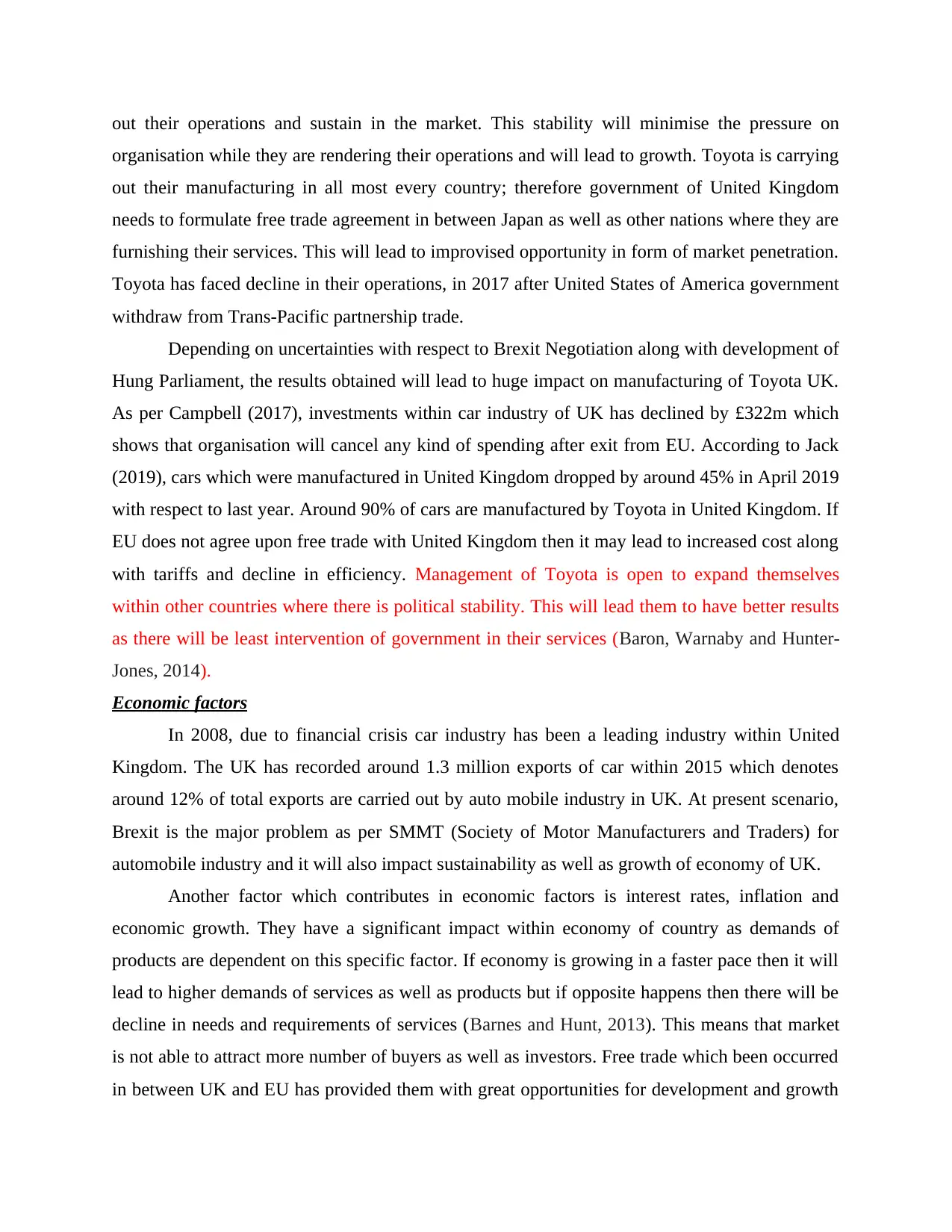
out their operations and sustain in the market. This stability will minimise the pressure on
organisation while they are rendering their operations and will lead to growth. Toyota is carrying
out their manufacturing in all most every country; therefore government of United Kingdom
needs to formulate free trade agreement in between Japan as well as other nations where they are
furnishing their services. This will lead to improvised opportunity in form of market penetration.
Toyota has faced decline in their operations, in 2017 after United States of America government
withdraw from Trans-Pacific partnership trade.
Depending on uncertainties with respect to Brexit Negotiation along with development of
Hung Parliament, the results obtained will lead to huge impact on manufacturing of Toyota UK.
As per Campbell (2017), investments within car industry of UK has declined by £322m which
shows that organisation will cancel any kind of spending after exit from EU. According to Jack
(2019), cars which were manufactured in United Kingdom dropped by around 45% in April 2019
with respect to last year. Around 90% of cars are manufactured by Toyota in United Kingdom. If
EU does not agree upon free trade with United Kingdom then it may lead to increased cost along
with tariffs and decline in efficiency. Management of Toyota is open to expand themselves
within other countries where there is political stability. This will lead them to have better results
as there will be least intervention of government in their services (Baron, Warnaby and Hunter‐
Jones, 2014).
Economic factors
In 2008, due to financial crisis car industry has been a leading industry within United
Kingdom. The UK has recorded around 1.3 million exports of car within 2015 which denotes
around 12% of total exports are carried out by auto mobile industry in UK. At present scenario,
Brexit is the major problem as per SMMT (Society of Motor Manufacturers and Traders) for
automobile industry and it will also impact sustainability as well as growth of economy of UK.
Another factor which contributes in economic factors is interest rates, inflation and
economic growth. They have a significant impact within economy of country as demands of
products are dependent on this specific factor. If economy is growing in a faster pace then it will
lead to higher demands of services as well as products but if opposite happens then there will be
decline in needs and requirements of services (Barnes and Hunt, 2013). This means that market
is not able to attract more number of buyers as well as investors. Free trade which been occurred
in between UK and EU has provided them with great opportunities for development and growth
organisation while they are rendering their operations and will lead to growth. Toyota is carrying
out their manufacturing in all most every country; therefore government of United Kingdom
needs to formulate free trade agreement in between Japan as well as other nations where they are
furnishing their services. This will lead to improvised opportunity in form of market penetration.
Toyota has faced decline in their operations, in 2017 after United States of America government
withdraw from Trans-Pacific partnership trade.
Depending on uncertainties with respect to Brexit Negotiation along with development of
Hung Parliament, the results obtained will lead to huge impact on manufacturing of Toyota UK.
As per Campbell (2017), investments within car industry of UK has declined by £322m which
shows that organisation will cancel any kind of spending after exit from EU. According to Jack
(2019), cars which were manufactured in United Kingdom dropped by around 45% in April 2019
with respect to last year. Around 90% of cars are manufactured by Toyota in United Kingdom. If
EU does not agree upon free trade with United Kingdom then it may lead to increased cost along
with tariffs and decline in efficiency. Management of Toyota is open to expand themselves
within other countries where there is political stability. This will lead them to have better results
as there will be least intervention of government in their services (Baron, Warnaby and Hunter‐
Jones, 2014).
Economic factors
In 2008, due to financial crisis car industry has been a leading industry within United
Kingdom. The UK has recorded around 1.3 million exports of car within 2015 which denotes
around 12% of total exports are carried out by auto mobile industry in UK. At present scenario,
Brexit is the major problem as per SMMT (Society of Motor Manufacturers and Traders) for
automobile industry and it will also impact sustainability as well as growth of economy of UK.
Another factor which contributes in economic factors is interest rates, inflation and
economic growth. They have a significant impact within economy of country as demands of
products are dependent on this specific factor. If economy is growing in a faster pace then it will
lead to higher demands of services as well as products but if opposite happens then there will be
decline in needs and requirements of services (Barnes and Hunt, 2013). This means that market
is not able to attract more number of buyers as well as investors. Free trade which been occurred
in between UK and EU has provided them with great opportunities for development and growth
Paraphrase This Document
Need a fresh take? Get an instant paraphrase of this document with our AI Paraphraser
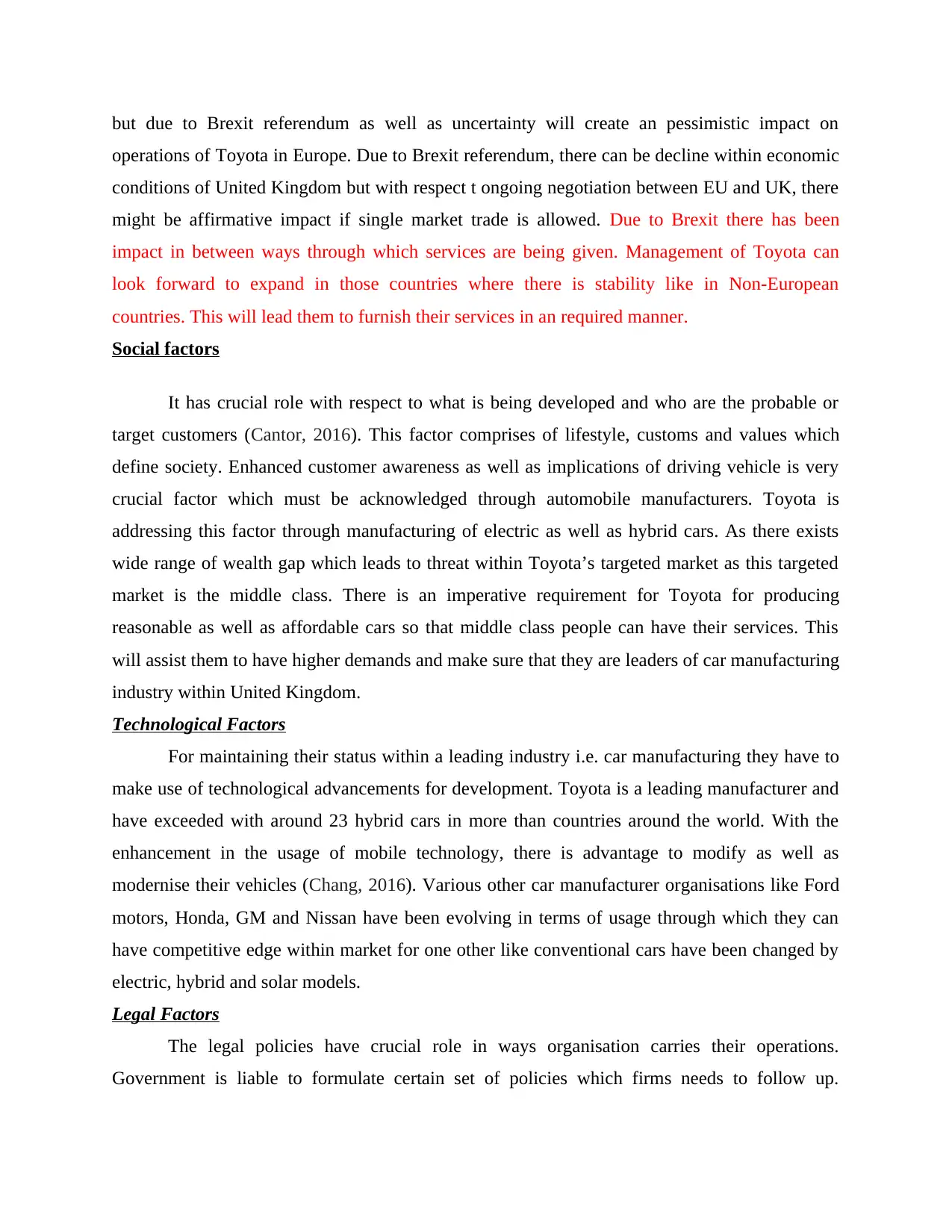
but due to Brexit referendum as well as uncertainty will create an pessimistic impact on
operations of Toyota in Europe. Due to Brexit referendum, there can be decline within economic
conditions of United Kingdom but with respect t ongoing negotiation between EU and UK, there
might be affirmative impact if single market trade is allowed. Due to Brexit there has been
impact in between ways through which services are being given. Management of Toyota can
look forward to expand in those countries where there is stability like in Non-European
countries. This will lead them to furnish their services in an required manner.
Social factors
It has crucial role with respect to what is being developed and who are the probable or
target customers (Cantor, 2016). This factor comprises of lifestyle, customs and values which
define society. Enhanced customer awareness as well as implications of driving vehicle is very
crucial factor which must be acknowledged through automobile manufacturers. Toyota is
addressing this factor through manufacturing of electric as well as hybrid cars. As there exists
wide range of wealth gap which leads to threat within Toyota’s targeted market as this targeted
market is the middle class. There is an imperative requirement for Toyota for producing
reasonable as well as affordable cars so that middle class people can have their services. This
will assist them to have higher demands and make sure that they are leaders of car manufacturing
industry within United Kingdom.
Technological Factors
For maintaining their status within a leading industry i.e. car manufacturing they have to
make use of technological advancements for development. Toyota is a leading manufacturer and
have exceeded with around 23 hybrid cars in more than countries around the world. With the
enhancement in the usage of mobile technology, there is advantage to modify as well as
modernise their vehicles (Chang, 2016). Various other car manufacturer organisations like Ford
motors, Honda, GM and Nissan have been evolving in terms of usage through which they can
have competitive edge within market for one other like conventional cars have been changed by
electric, hybrid and solar models.
Legal Factors
The legal policies have crucial role in ways organisation carries their operations.
Government is liable to formulate certain set of policies which firms needs to follow up.
operations of Toyota in Europe. Due to Brexit referendum, there can be decline within economic
conditions of United Kingdom but with respect t ongoing negotiation between EU and UK, there
might be affirmative impact if single market trade is allowed. Due to Brexit there has been
impact in between ways through which services are being given. Management of Toyota can
look forward to expand in those countries where there is stability like in Non-European
countries. This will lead them to furnish their services in an required manner.
Social factors
It has crucial role with respect to what is being developed and who are the probable or
target customers (Cantor, 2016). This factor comprises of lifestyle, customs and values which
define society. Enhanced customer awareness as well as implications of driving vehicle is very
crucial factor which must be acknowledged through automobile manufacturers. Toyota is
addressing this factor through manufacturing of electric as well as hybrid cars. As there exists
wide range of wealth gap which leads to threat within Toyota’s targeted market as this targeted
market is the middle class. There is an imperative requirement for Toyota for producing
reasonable as well as affordable cars so that middle class people can have their services. This
will assist them to have higher demands and make sure that they are leaders of car manufacturing
industry within United Kingdom.
Technological Factors
For maintaining their status within a leading industry i.e. car manufacturing they have to
make use of technological advancements for development. Toyota is a leading manufacturer and
have exceeded with around 23 hybrid cars in more than countries around the world. With the
enhancement in the usage of mobile technology, there is advantage to modify as well as
modernise their vehicles (Chang, 2016). Various other car manufacturer organisations like Ford
motors, Honda, GM and Nissan have been evolving in terms of usage through which they can
have competitive edge within market for one other like conventional cars have been changed by
electric, hybrid and solar models.
Legal Factors
The legal policies have crucial role in ways organisation carries their operations.
Government is liable to formulate certain set of policies which firms needs to follow up.
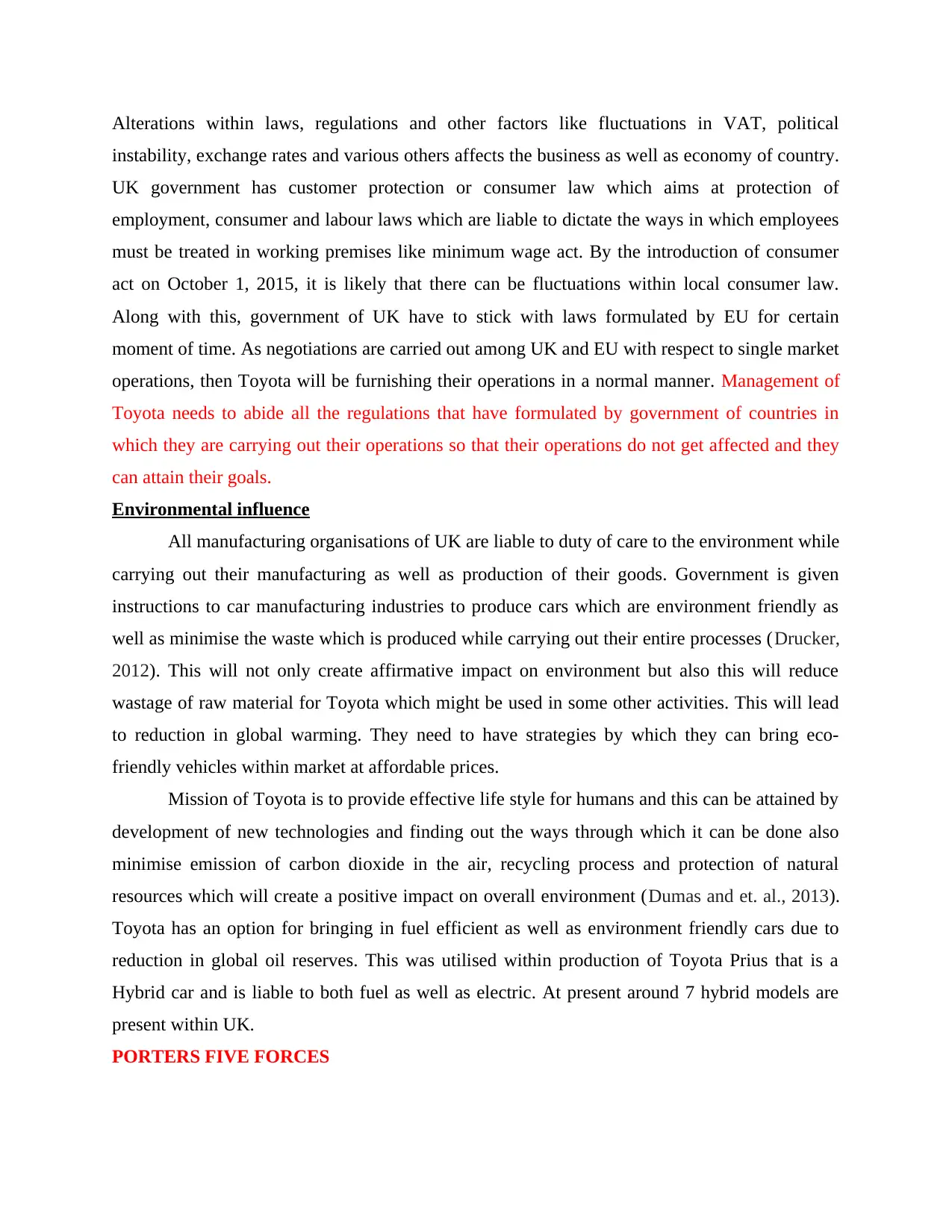
Alterations within laws, regulations and other factors like fluctuations in VAT, political
instability, exchange rates and various others affects the business as well as economy of country.
UK government has customer protection or consumer law which aims at protection of
employment, consumer and labour laws which are liable to dictate the ways in which employees
must be treated in working premises like minimum wage act. By the introduction of consumer
act on October 1, 2015, it is likely that there can be fluctuations within local consumer law.
Along with this, government of UK have to stick with laws formulated by EU for certain
moment of time. As negotiations are carried out among UK and EU with respect to single market
operations, then Toyota will be furnishing their operations in a normal manner. Management of
Toyota needs to abide all the regulations that have formulated by government of countries in
which they are carrying out their operations so that their operations do not get affected and they
can attain their goals.
Environmental influence
All manufacturing organisations of UK are liable to duty of care to the environment while
carrying out their manufacturing as well as production of their goods. Government is given
instructions to car manufacturing industries to produce cars which are environment friendly as
well as minimise the waste which is produced while carrying out their entire processes (Drucker,
2012). This will not only create affirmative impact on environment but also this will reduce
wastage of raw material for Toyota which might be used in some other activities. This will lead
to reduction in global warming. They need to have strategies by which they can bring eco-
friendly vehicles within market at affordable prices.
Mission of Toyota is to provide effective life style for humans and this can be attained by
development of new technologies and finding out the ways through which it can be done also
minimise emission of carbon dioxide in the air, recycling process and protection of natural
resources which will create a positive impact on overall environment (Dumas and et. al., 2013).
Toyota has an option for bringing in fuel efficient as well as environment friendly cars due to
reduction in global oil reserves. This was utilised within production of Toyota Prius that is a
Hybrid car and is liable to both fuel as well as electric. At present around 7 hybrid models are
present within UK.
PORTERS FIVE FORCES
instability, exchange rates and various others affects the business as well as economy of country.
UK government has customer protection or consumer law which aims at protection of
employment, consumer and labour laws which are liable to dictate the ways in which employees
must be treated in working premises like minimum wage act. By the introduction of consumer
act on October 1, 2015, it is likely that there can be fluctuations within local consumer law.
Along with this, government of UK have to stick with laws formulated by EU for certain
moment of time. As negotiations are carried out among UK and EU with respect to single market
operations, then Toyota will be furnishing their operations in a normal manner. Management of
Toyota needs to abide all the regulations that have formulated by government of countries in
which they are carrying out their operations so that their operations do not get affected and they
can attain their goals.
Environmental influence
All manufacturing organisations of UK are liable to duty of care to the environment while
carrying out their manufacturing as well as production of their goods. Government is given
instructions to car manufacturing industries to produce cars which are environment friendly as
well as minimise the waste which is produced while carrying out their entire processes (Drucker,
2012). This will not only create affirmative impact on environment but also this will reduce
wastage of raw material for Toyota which might be used in some other activities. This will lead
to reduction in global warming. They need to have strategies by which they can bring eco-
friendly vehicles within market at affordable prices.
Mission of Toyota is to provide effective life style for humans and this can be attained by
development of new technologies and finding out the ways through which it can be done also
minimise emission of carbon dioxide in the air, recycling process and protection of natural
resources which will create a positive impact on overall environment (Dumas and et. al., 2013).
Toyota has an option for bringing in fuel efficient as well as environment friendly cars due to
reduction in global oil reserves. This was utilised within production of Toyota Prius that is a
Hybrid car and is liable to both fuel as well as electric. At present around 7 hybrid models are
present within UK.
PORTERS FIVE FORCES
⊘ This is a preview!⊘
Do you want full access?
Subscribe today to unlock all pages.

Trusted by 1+ million students worldwide
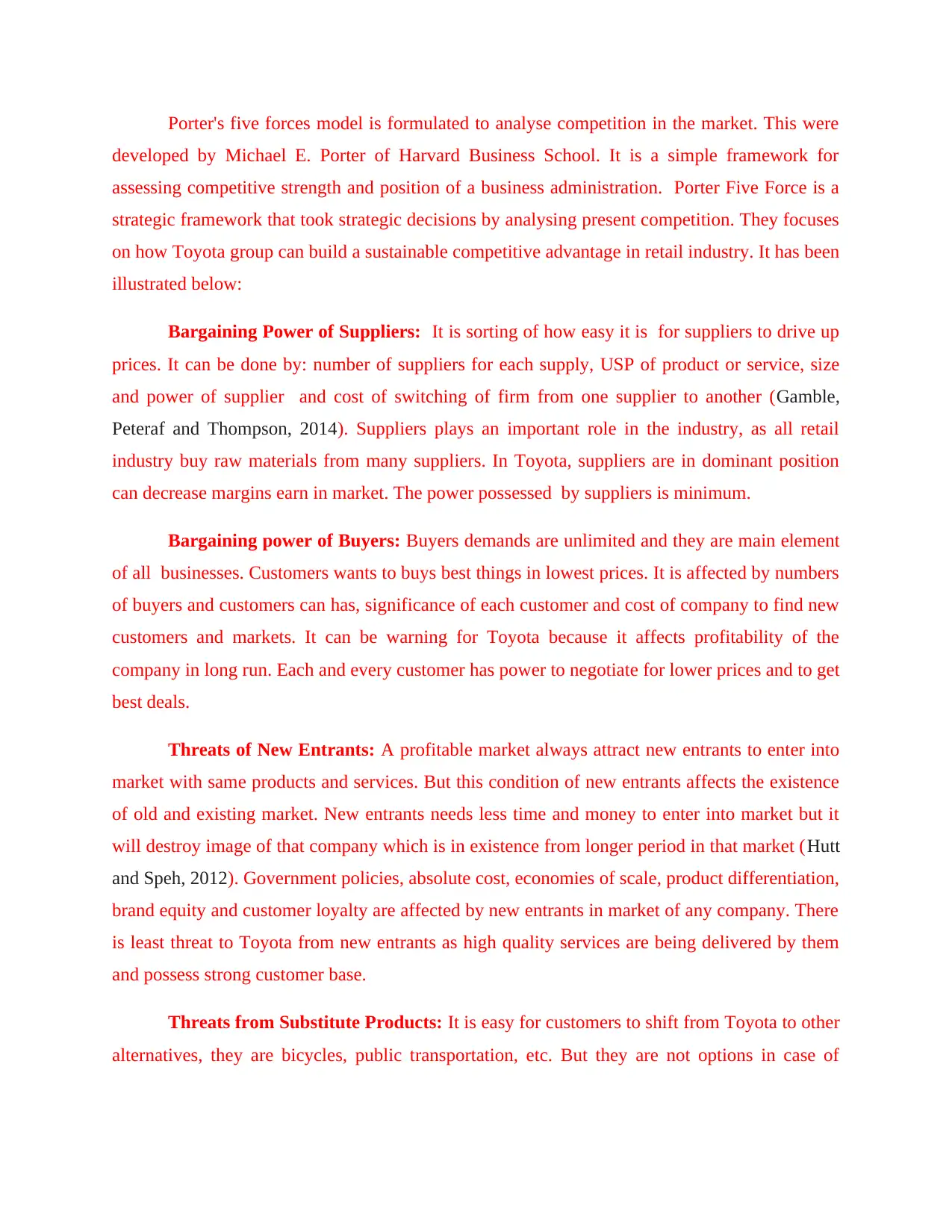
Porter's five forces model is formulated to analyse competition in the market. This were
developed by Michael E. Porter of Harvard Business School. It is a simple framework for
assessing competitive strength and position of a business administration. Porter Five Force is a
strategic framework that took strategic decisions by analysing present competition. They focuses
on how Toyota group can build a sustainable competitive advantage in retail industry. It has been
illustrated below:
Bargaining Power of Suppliers: It is sorting of how easy it is for suppliers to drive up
prices. It can be done by: number of suppliers for each supply, USP of product or service, size
and power of supplier and cost of switching of firm from one supplier to another (Gamble,
Peteraf and Thompson, 2014). Suppliers plays an important role in the industry, as all retail
industry buy raw materials from many suppliers. In Toyota, suppliers are in dominant position
can decrease margins earn in market. The power possessed by suppliers is minimum.
Bargaining power of Buyers: Buyers demands are unlimited and they are main element
of all businesses. Customers wants to buys best things in lowest prices. It is affected by numbers
of buyers and customers can has, significance of each customer and cost of company to find new
customers and markets. It can be warning for Toyota because it affects profitability of the
company in long run. Each and every customer has power to negotiate for lower prices and to get
best deals.
Threats of New Entrants: A profitable market always attract new entrants to enter into
market with same products and services. But this condition of new entrants affects the existence
of old and existing market. New entrants needs less time and money to enter into market but it
will destroy image of that company which is in existence from longer period in that market (Hutt
and Speh, 2012). Government policies, absolute cost, economies of scale, product differentiation,
brand equity and customer loyalty are affected by new entrants in market of any company. There
is least threat to Toyota from new entrants as high quality services are being delivered by them
and possess strong customer base.
Threats from Substitute Products: It is easy for customers to shift from Toyota to other
alternatives, they are bicycles, public transportation, etc. But they are not options in case of
developed by Michael E. Porter of Harvard Business School. It is a simple framework for
assessing competitive strength and position of a business administration. Porter Five Force is a
strategic framework that took strategic decisions by analysing present competition. They focuses
on how Toyota group can build a sustainable competitive advantage in retail industry. It has been
illustrated below:
Bargaining Power of Suppliers: It is sorting of how easy it is for suppliers to drive up
prices. It can be done by: number of suppliers for each supply, USP of product or service, size
and power of supplier and cost of switching of firm from one supplier to another (Gamble,
Peteraf and Thompson, 2014). Suppliers plays an important role in the industry, as all retail
industry buy raw materials from many suppliers. In Toyota, suppliers are in dominant position
can decrease margins earn in market. The power possessed by suppliers is minimum.
Bargaining power of Buyers: Buyers demands are unlimited and they are main element
of all businesses. Customers wants to buys best things in lowest prices. It is affected by numbers
of buyers and customers can has, significance of each customer and cost of company to find new
customers and markets. It can be warning for Toyota because it affects profitability of the
company in long run. Each and every customer has power to negotiate for lower prices and to get
best deals.
Threats of New Entrants: A profitable market always attract new entrants to enter into
market with same products and services. But this condition of new entrants affects the existence
of old and existing market. New entrants needs less time and money to enter into market but it
will destroy image of that company which is in existence from longer period in that market (Hutt
and Speh, 2012). Government policies, absolute cost, economies of scale, product differentiation,
brand equity and customer loyalty are affected by new entrants in market of any company. There
is least threat to Toyota from new entrants as high quality services are being delivered by them
and possess strong customer base.
Threats from Substitute Products: It is easy for customers to shift from Toyota to other
alternatives, they are bicycles, public transportation, etc. But they are not options in case of
Paraphrase This Document
Need a fresh take? Get an instant paraphrase of this document with our AI Paraphraser
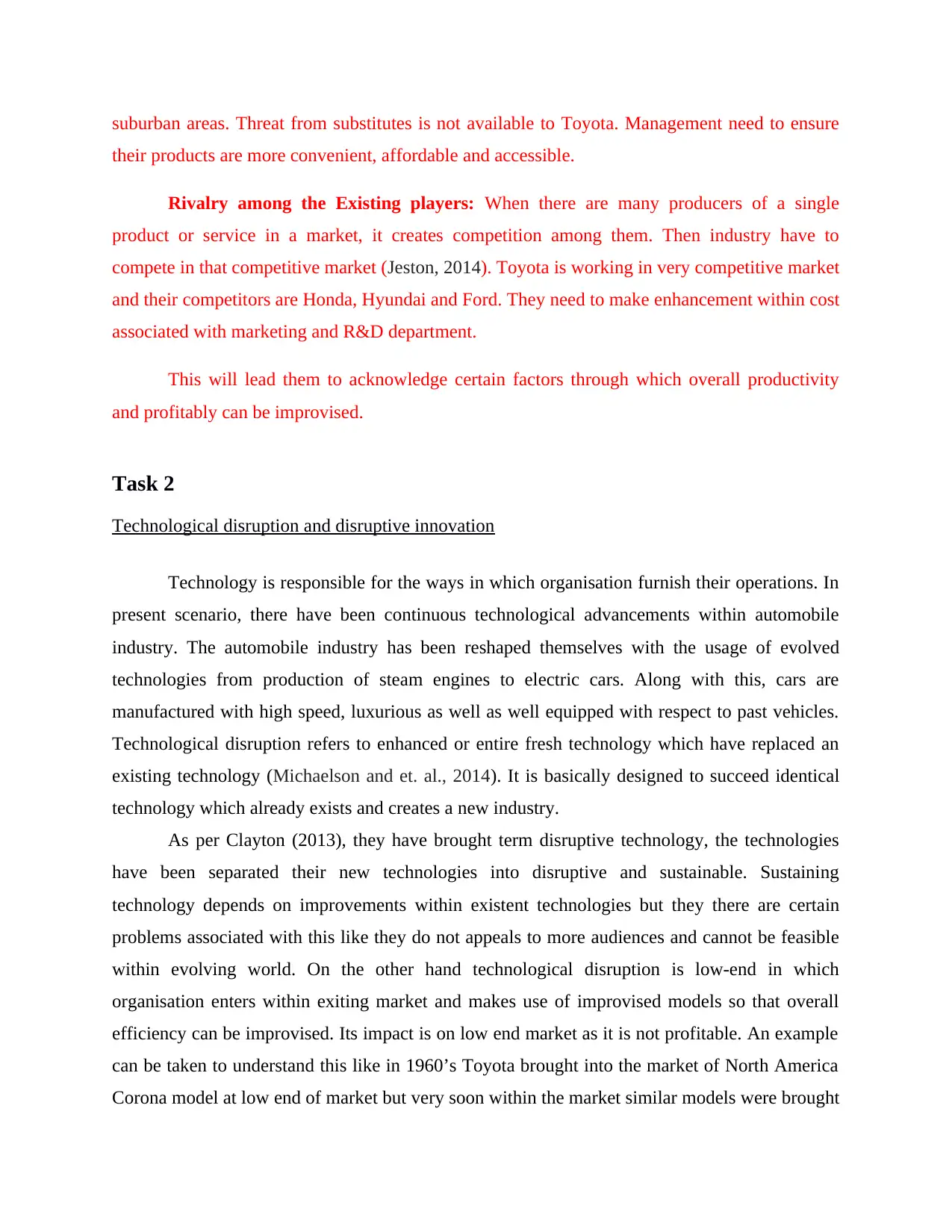
suburban areas. Threat from substitutes is not available to Toyota. Management need to ensure
their products are more convenient, affordable and accessible.
Rivalry among the Existing players: When there are many producers of a single
product or service in a market, it creates competition among them. Then industry have to
compete in that competitive market (Jeston, 2014). Toyota is working in very competitive market
and their competitors are Honda, Hyundai and Ford. They need to make enhancement within cost
associated with marketing and R&D department.
This will lead them to acknowledge certain factors through which overall productivity
and profitably can be improvised.
Task 2
Technological disruption and disruptive innovation
Technology is responsible for the ways in which organisation furnish their operations. In
present scenario, there have been continuous technological advancements within automobile
industry. The automobile industry has been reshaped themselves with the usage of evolved
technologies from production of steam engines to electric cars. Along with this, cars are
manufactured with high speed, luxurious as well as well equipped with respect to past vehicles.
Technological disruption refers to enhanced or entire fresh technology which have replaced an
existing technology (Michaelson and et. al., 2014). It is basically designed to succeed identical
technology which already exists and creates a new industry.
As per Clayton (2013), they have brought term disruptive technology, the technologies
have been separated their new technologies into disruptive and sustainable. Sustaining
technology depends on improvements within existent technologies but they there are certain
problems associated with this like they do not appeals to more audiences and cannot be feasible
within evolving world. On the other hand technological disruption is low-end in which
organisation enters within exiting market and makes use of improvised models so that overall
efficiency can be improvised. Its impact is on low end market as it is not profitable. An example
can be taken to understand this like in 1960’s Toyota brought into the market of North America
Corona model at low end of market but very soon within the market similar models were brought
their products are more convenient, affordable and accessible.
Rivalry among the Existing players: When there are many producers of a single
product or service in a market, it creates competition among them. Then industry have to
compete in that competitive market (Jeston, 2014). Toyota is working in very competitive market
and their competitors are Honda, Hyundai and Ford. They need to make enhancement within cost
associated with marketing and R&D department.
This will lead them to acknowledge certain factors through which overall productivity
and profitably can be improvised.
Task 2
Technological disruption and disruptive innovation
Technology is responsible for the ways in which organisation furnish their operations. In
present scenario, there have been continuous technological advancements within automobile
industry. The automobile industry has been reshaped themselves with the usage of evolved
technologies from production of steam engines to electric cars. Along with this, cars are
manufactured with high speed, luxurious as well as well equipped with respect to past vehicles.
Technological disruption refers to enhanced or entire fresh technology which have replaced an
existing technology (Michaelson and et. al., 2014). It is basically designed to succeed identical
technology which already exists and creates a new industry.
As per Clayton (2013), they have brought term disruptive technology, the technologies
have been separated their new technologies into disruptive and sustainable. Sustaining
technology depends on improvements within existent technologies but they there are certain
problems associated with this like they do not appeals to more audiences and cannot be feasible
within evolving world. On the other hand technological disruption is low-end in which
organisation enters within exiting market and makes use of improvised models so that overall
efficiency can be improvised. Its impact is on low end market as it is not profitable. An example
can be taken to understand this like in 1960’s Toyota brought into the market of North America
Corona model at low end of market but very soon within the market similar models were brought
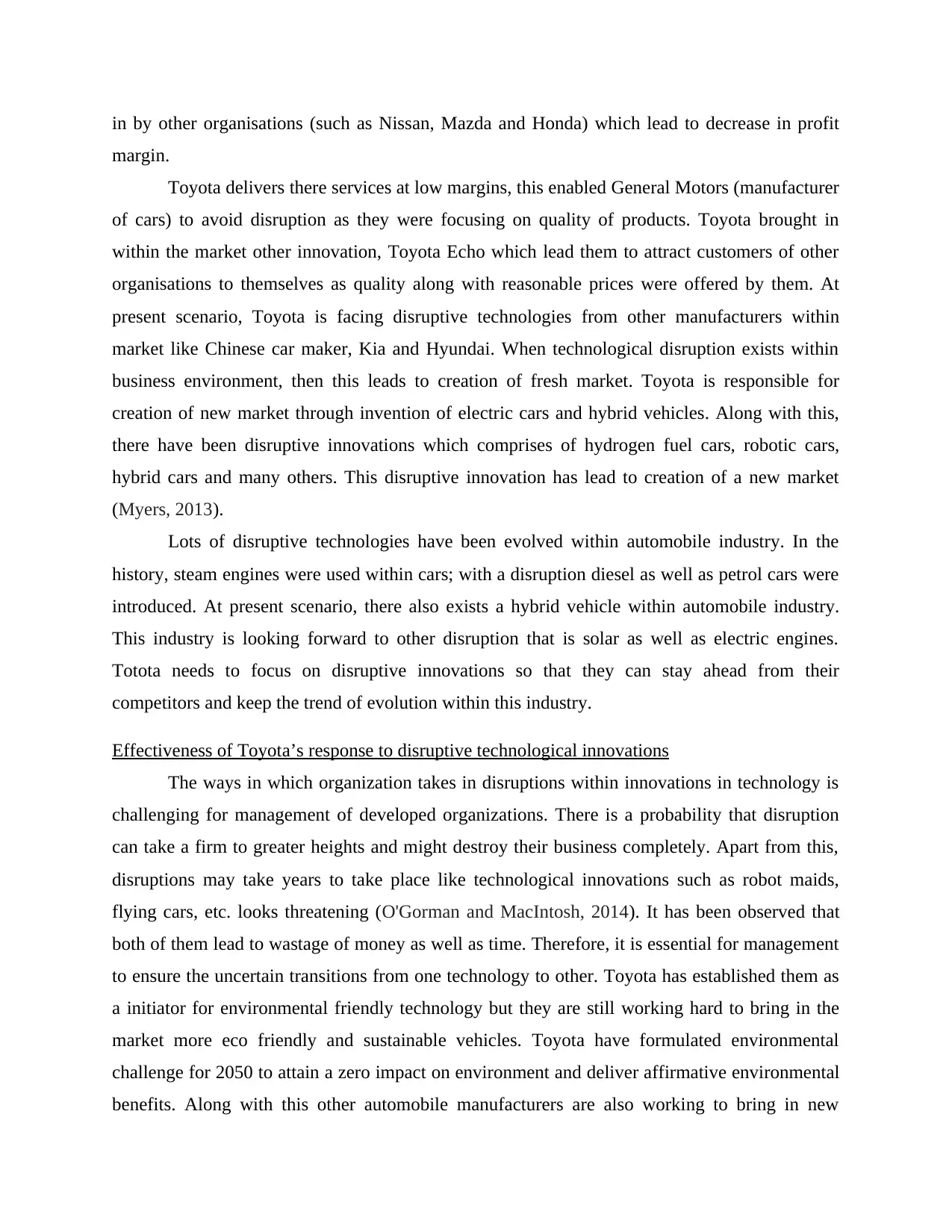
in by other organisations (such as Nissan, Mazda and Honda) which lead to decrease in profit
margin.
Toyota delivers there services at low margins, this enabled General Motors (manufacturer
of cars) to avoid disruption as they were focusing on quality of products. Toyota brought in
within the market other innovation, Toyota Echo which lead them to attract customers of other
organisations to themselves as quality along with reasonable prices were offered by them. At
present scenario, Toyota is facing disruptive technologies from other manufacturers within
market like Chinese car maker, Kia and Hyundai. When technological disruption exists within
business environment, then this leads to creation of fresh market. Toyota is responsible for
creation of new market through invention of electric cars and hybrid vehicles. Along with this,
there have been disruptive innovations which comprises of hydrogen fuel cars, robotic cars,
hybrid cars and many others. This disruptive innovation has lead to creation of a new market
(Myers, 2013).
Lots of disruptive technologies have been evolved within automobile industry. In the
history, steam engines were used within cars; with a disruption diesel as well as petrol cars were
introduced. At present scenario, there also exists a hybrid vehicle within automobile industry.
This industry is looking forward to other disruption that is solar as well as electric engines.
Totota needs to focus on disruptive innovations so that they can stay ahead from their
competitors and keep the trend of evolution within this industry.
Effectiveness of Toyota’s response to disruptive technological innovations
The ways in which organization takes in disruptions within innovations in technology is
challenging for management of developed organizations. There is a probability that disruption
can take a firm to greater heights and might destroy their business completely. Apart from this,
disruptions may take years to take place like technological innovations such as robot maids,
flying cars, etc. looks threatening (O'Gorman and MacIntosh, 2014). It has been observed that
both of them lead to wastage of money as well as time. Therefore, it is essential for management
to ensure the uncertain transitions from one technology to other. Toyota has established them as
a initiator for environmental friendly technology but they are still working hard to bring in the
market more eco friendly and sustainable vehicles. Toyota have formulated environmental
challenge for 2050 to attain a zero impact on environment and deliver affirmative environmental
benefits. Along with this other automobile manufacturers are also working to bring in new
margin.
Toyota delivers there services at low margins, this enabled General Motors (manufacturer
of cars) to avoid disruption as they were focusing on quality of products. Toyota brought in
within the market other innovation, Toyota Echo which lead them to attract customers of other
organisations to themselves as quality along with reasonable prices were offered by them. At
present scenario, Toyota is facing disruptive technologies from other manufacturers within
market like Chinese car maker, Kia and Hyundai. When technological disruption exists within
business environment, then this leads to creation of fresh market. Toyota is responsible for
creation of new market through invention of electric cars and hybrid vehicles. Along with this,
there have been disruptive innovations which comprises of hydrogen fuel cars, robotic cars,
hybrid cars and many others. This disruptive innovation has lead to creation of a new market
(Myers, 2013).
Lots of disruptive technologies have been evolved within automobile industry. In the
history, steam engines were used within cars; with a disruption diesel as well as petrol cars were
introduced. At present scenario, there also exists a hybrid vehicle within automobile industry.
This industry is looking forward to other disruption that is solar as well as electric engines.
Totota needs to focus on disruptive innovations so that they can stay ahead from their
competitors and keep the trend of evolution within this industry.
Effectiveness of Toyota’s response to disruptive technological innovations
The ways in which organization takes in disruptions within innovations in technology is
challenging for management of developed organizations. There is a probability that disruption
can take a firm to greater heights and might destroy their business completely. Apart from this,
disruptions may take years to take place like technological innovations such as robot maids,
flying cars, etc. looks threatening (O'Gorman and MacIntosh, 2014). It has been observed that
both of them lead to wastage of money as well as time. Therefore, it is essential for management
to ensure the uncertain transitions from one technology to other. Toyota has established them as
a initiator for environmental friendly technology but they are still working hard to bring in the
market more eco friendly and sustainable vehicles. Toyota have formulated environmental
challenge for 2050 to attain a zero impact on environment and deliver affirmative environmental
benefits. Along with this other automobile manufacturers are also working to bring in new
⊘ This is a preview!⊘
Do you want full access?
Subscribe today to unlock all pages.

Trusted by 1+ million students worldwide
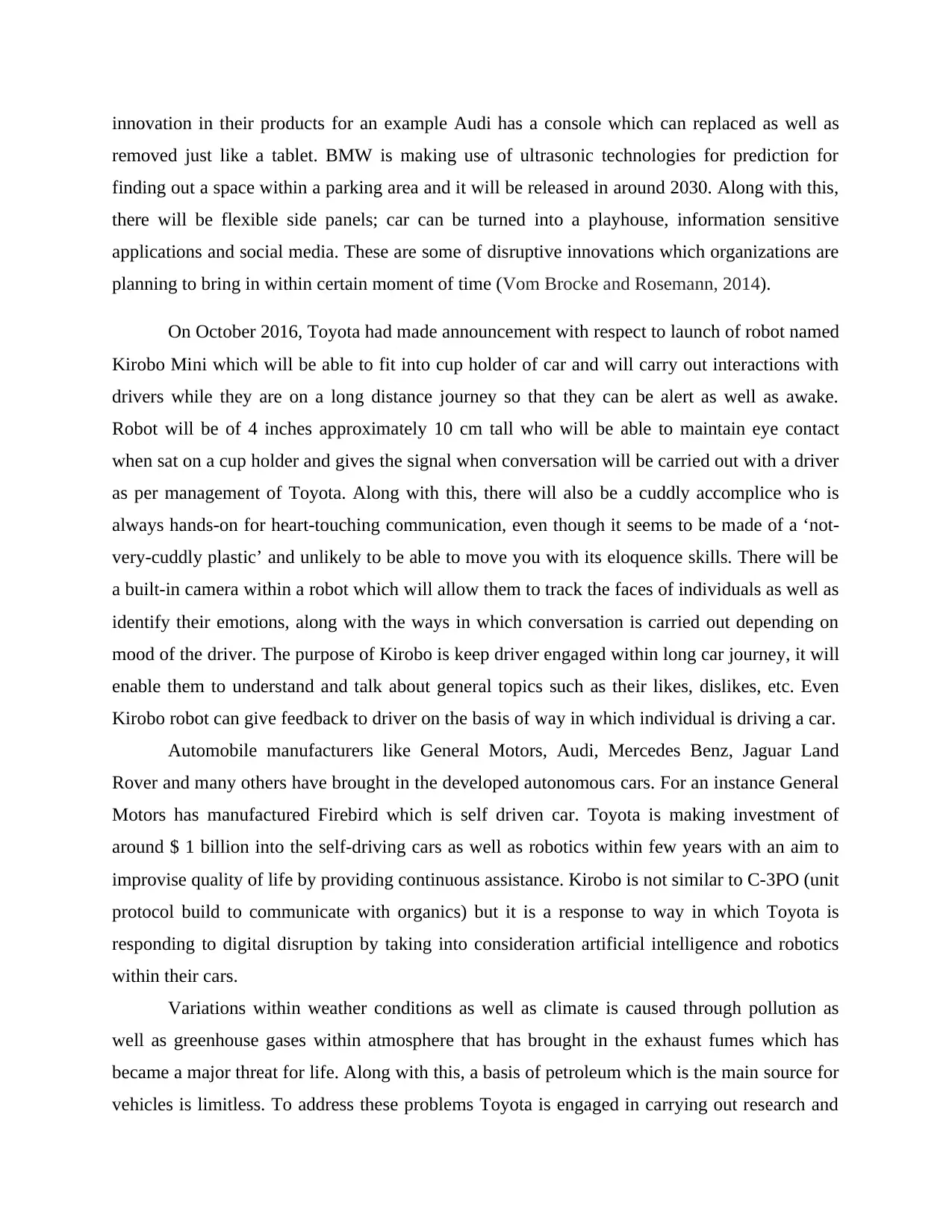
innovation in their products for an example Audi has a console which can replaced as well as
removed just like a tablet. BMW is making use of ultrasonic technologies for prediction for
finding out a space within a parking area and it will be released in around 2030. Along with this,
there will be flexible side panels; car can be turned into a playhouse, information sensitive
applications and social media. These are some of disruptive innovations which organizations are
planning to bring in within certain moment of time (Vom Brocke and Rosemann, 2014).
On October 2016, Toyota had made announcement with respect to launch of robot named
Kirobo Mini which will be able to fit into cup holder of car and will carry out interactions with
drivers while they are on a long distance journey so that they can be alert as well as awake.
Robot will be of 4 inches approximately 10 cm tall who will be able to maintain eye contact
when sat on a cup holder and gives the signal when conversation will be carried out with a driver
as per management of Toyota. Along with this, there will also be a cuddly accomplice who is
always hands-on for heart-touching communication, even though it seems to be made of a ‘not-
very-cuddly plastic’ and unlikely to be able to move you with its eloquence skills. There will be
a built-in camera within a robot which will allow them to track the faces of individuals as well as
identify their emotions, along with the ways in which conversation is carried out depending on
mood of the driver. The purpose of Kirobo is keep driver engaged within long car journey, it will
enable them to understand and talk about general topics such as their likes, dislikes, etc. Even
Kirobo robot can give feedback to driver on the basis of way in which individual is driving a car.
Automobile manufacturers like General Motors, Audi, Mercedes Benz, Jaguar Land
Rover and many others have brought in the developed autonomous cars. For an instance General
Motors has manufactured Firebird which is self driven car. Toyota is making investment of
around $ 1 billion into the self-driving cars as well as robotics within few years with an aim to
improvise quality of life by providing continuous assistance. Kirobo is not similar to C-3PO (unit
protocol build to communicate with organics) but it is a response to way in which Toyota is
responding to digital disruption by taking into consideration artificial intelligence and robotics
within their cars.
Variations within weather conditions as well as climate is caused through pollution as
well as greenhouse gases within atmosphere that has brought in the exhaust fumes which has
became a major threat for life. Along with this, a basis of petroleum which is the main source for
vehicles is limitless. To address these problems Toyota is engaged in carrying out research and
removed just like a tablet. BMW is making use of ultrasonic technologies for prediction for
finding out a space within a parking area and it will be released in around 2030. Along with this,
there will be flexible side panels; car can be turned into a playhouse, information sensitive
applications and social media. These are some of disruptive innovations which organizations are
planning to bring in within certain moment of time (Vom Brocke and Rosemann, 2014).
On October 2016, Toyota had made announcement with respect to launch of robot named
Kirobo Mini which will be able to fit into cup holder of car and will carry out interactions with
drivers while they are on a long distance journey so that they can be alert as well as awake.
Robot will be of 4 inches approximately 10 cm tall who will be able to maintain eye contact
when sat on a cup holder and gives the signal when conversation will be carried out with a driver
as per management of Toyota. Along with this, there will also be a cuddly accomplice who is
always hands-on for heart-touching communication, even though it seems to be made of a ‘not-
very-cuddly plastic’ and unlikely to be able to move you with its eloquence skills. There will be
a built-in camera within a robot which will allow them to track the faces of individuals as well as
identify their emotions, along with the ways in which conversation is carried out depending on
mood of the driver. The purpose of Kirobo is keep driver engaged within long car journey, it will
enable them to understand and talk about general topics such as their likes, dislikes, etc. Even
Kirobo robot can give feedback to driver on the basis of way in which individual is driving a car.
Automobile manufacturers like General Motors, Audi, Mercedes Benz, Jaguar Land
Rover and many others have brought in the developed autonomous cars. For an instance General
Motors has manufactured Firebird which is self driven car. Toyota is making investment of
around $ 1 billion into the self-driving cars as well as robotics within few years with an aim to
improvise quality of life by providing continuous assistance. Kirobo is not similar to C-3PO (unit
protocol build to communicate with organics) but it is a response to way in which Toyota is
responding to digital disruption by taking into consideration artificial intelligence and robotics
within their cars.
Variations within weather conditions as well as climate is caused through pollution as
well as greenhouse gases within atmosphere that has brought in the exhaust fumes which has
became a major threat for life. Along with this, a basis of petroleum which is the main source for
vehicles is limitless. To address these problems Toyota is engaged in carrying out research and
Paraphrase This Document
Need a fresh take? Get an instant paraphrase of this document with our AI Paraphraser
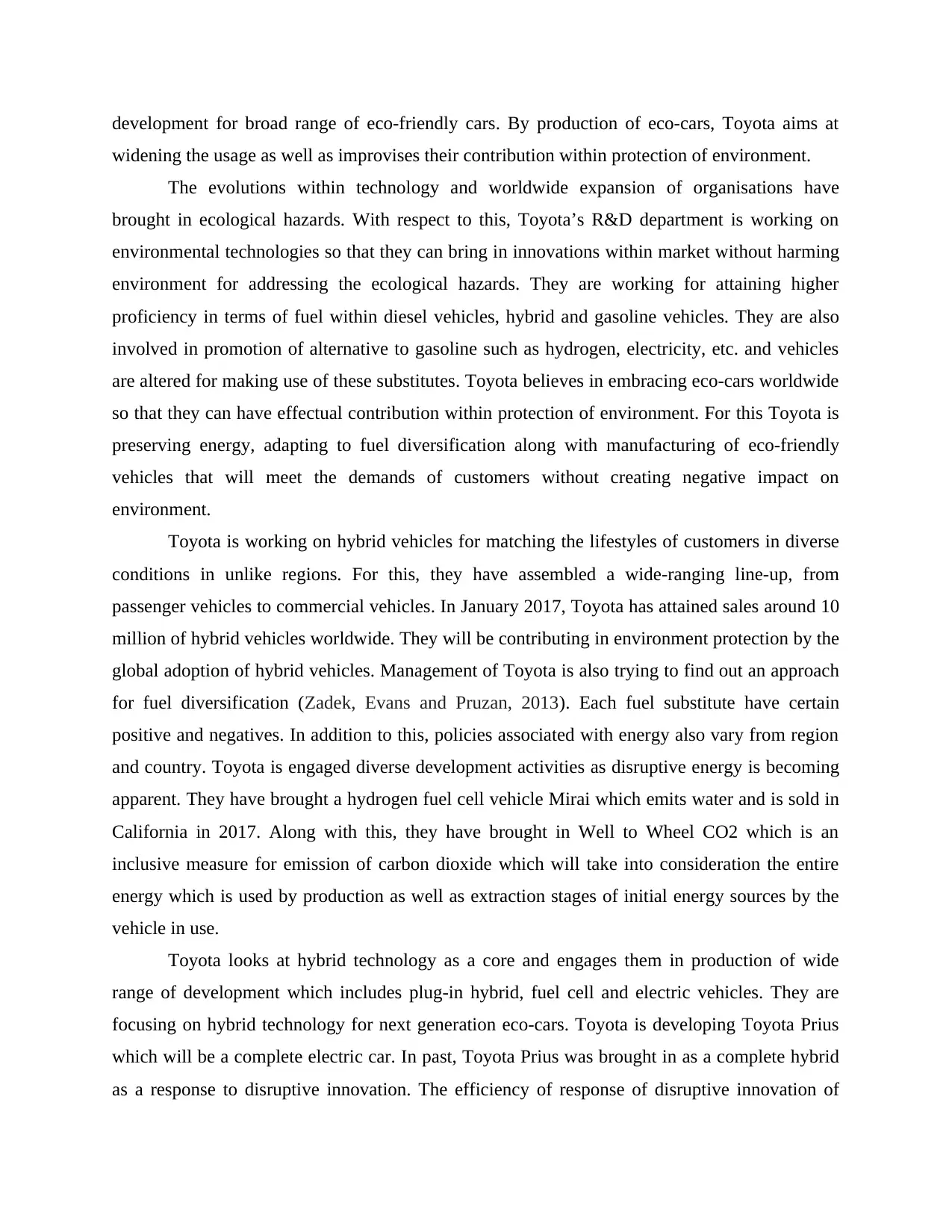
development for broad range of eco-friendly cars. By production of eco-cars, Toyota aims at
widening the usage as well as improvises their contribution within protection of environment.
The evolutions within technology and worldwide expansion of organisations have
brought in ecological hazards. With respect to this, Toyota’s R&D department is working on
environmental technologies so that they can bring in innovations within market without harming
environment for addressing the ecological hazards. They are working for attaining higher
proficiency in terms of fuel within diesel vehicles, hybrid and gasoline vehicles. They are also
involved in promotion of alternative to gasoline such as hydrogen, electricity, etc. and vehicles
are altered for making use of these substitutes. Toyota believes in embracing eco-cars worldwide
so that they can have effectual contribution within protection of environment. For this Toyota is
preserving energy, adapting to fuel diversification along with manufacturing of eco-friendly
vehicles that will meet the demands of customers without creating negative impact on
environment.
Toyota is working on hybrid vehicles for matching the lifestyles of customers in diverse
conditions in unlike regions. For this, they have assembled a wide-ranging line-up, from
passenger vehicles to commercial vehicles. In January 2017, Toyota has attained sales around 10
million of hybrid vehicles worldwide. They will be contributing in environment protection by the
global adoption of hybrid vehicles. Management of Toyota is also trying to find out an approach
for fuel diversification (Zadek, Evans and Pruzan, 2013). Each fuel substitute have certain
positive and negatives. In addition to this, policies associated with energy also vary from region
and country. Toyota is engaged diverse development activities as disruptive energy is becoming
apparent. They have brought a hydrogen fuel cell vehicle Mirai which emits water and is sold in
California in 2017. Along with this, they have brought in Well to Wheel CO2 which is an
inclusive measure for emission of carbon dioxide which will take into consideration the entire
energy which is used by production as well as extraction stages of initial energy sources by the
vehicle in use.
Toyota looks at hybrid technology as a core and engages them in production of wide
range of development which includes plug-in hybrid, fuel cell and electric vehicles. They are
focusing on hybrid technology for next generation eco-cars. Toyota is developing Toyota Prius
which will be a complete electric car. In past, Toyota Prius was brought in as a complete hybrid
as a response to disruptive innovation. The efficiency of response of disruptive innovation of
widening the usage as well as improvises their contribution within protection of environment.
The evolutions within technology and worldwide expansion of organisations have
brought in ecological hazards. With respect to this, Toyota’s R&D department is working on
environmental technologies so that they can bring in innovations within market without harming
environment for addressing the ecological hazards. They are working for attaining higher
proficiency in terms of fuel within diesel vehicles, hybrid and gasoline vehicles. They are also
involved in promotion of alternative to gasoline such as hydrogen, electricity, etc. and vehicles
are altered for making use of these substitutes. Toyota believes in embracing eco-cars worldwide
so that they can have effectual contribution within protection of environment. For this Toyota is
preserving energy, adapting to fuel diversification along with manufacturing of eco-friendly
vehicles that will meet the demands of customers without creating negative impact on
environment.
Toyota is working on hybrid vehicles for matching the lifestyles of customers in diverse
conditions in unlike regions. For this, they have assembled a wide-ranging line-up, from
passenger vehicles to commercial vehicles. In January 2017, Toyota has attained sales around 10
million of hybrid vehicles worldwide. They will be contributing in environment protection by the
global adoption of hybrid vehicles. Management of Toyota is also trying to find out an approach
for fuel diversification (Zadek, Evans and Pruzan, 2013). Each fuel substitute have certain
positive and negatives. In addition to this, policies associated with energy also vary from region
and country. Toyota is engaged diverse development activities as disruptive energy is becoming
apparent. They have brought a hydrogen fuel cell vehicle Mirai which emits water and is sold in
California in 2017. Along with this, they have brought in Well to Wheel CO2 which is an
inclusive measure for emission of carbon dioxide which will take into consideration the entire
energy which is used by production as well as extraction stages of initial energy sources by the
vehicle in use.
Toyota looks at hybrid technology as a core and engages them in production of wide
range of development which includes plug-in hybrid, fuel cell and electric vehicles. They are
focusing on hybrid technology for next generation eco-cars. Toyota is developing Toyota Prius
which will be a complete electric car. In past, Toyota Prius was brought in as a complete hybrid
as a response to disruptive innovation. The efficiency of response of disruptive innovation of
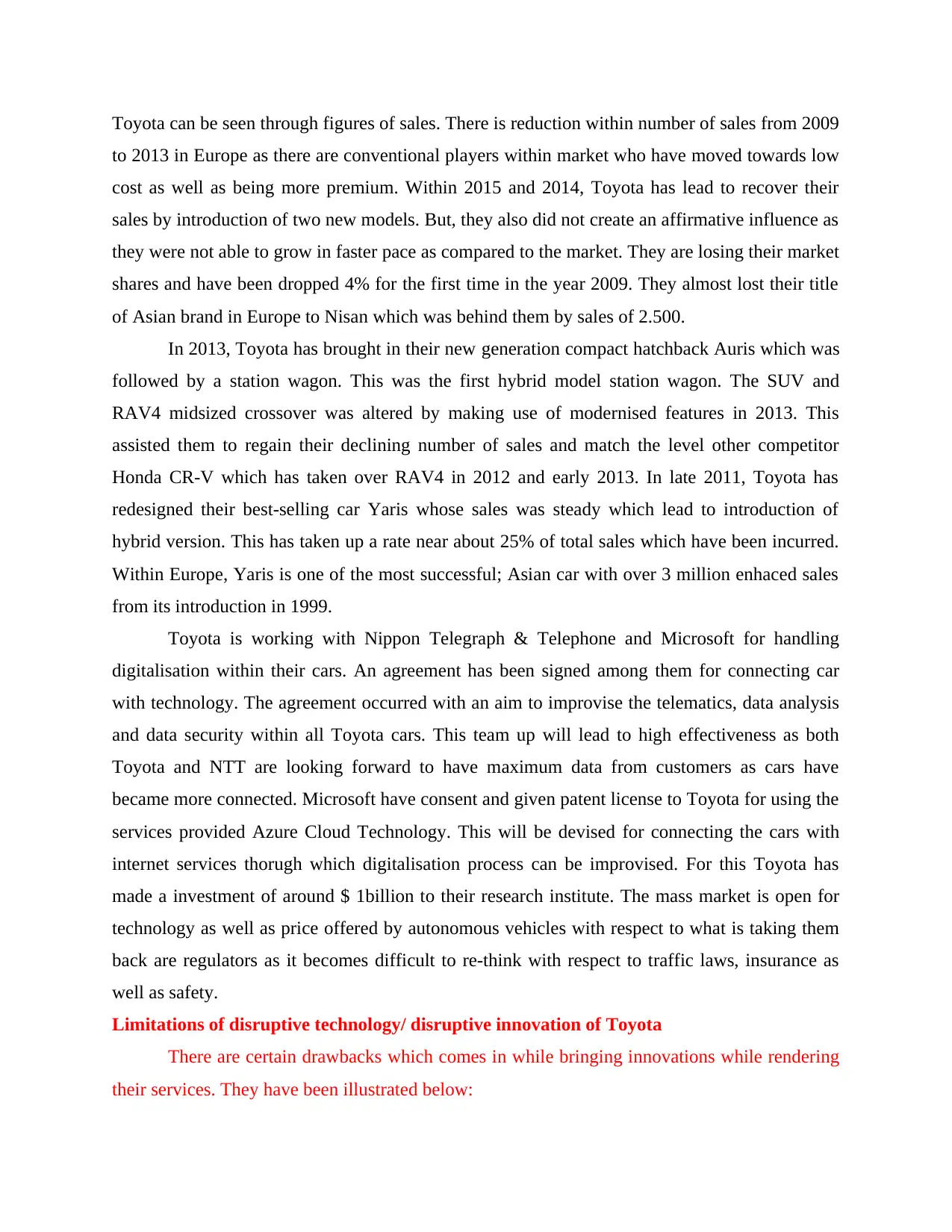
Toyota can be seen through figures of sales. There is reduction within number of sales from 2009
to 2013 in Europe as there are conventional players within market who have moved towards low
cost as well as being more premium. Within 2015 and 2014, Toyota has lead to recover their
sales by introduction of two new models. But, they also did not create an affirmative influence as
they were not able to grow in faster pace as compared to the market. They are losing their market
shares and have been dropped 4% for the first time in the year 2009. They almost lost their title
of Asian brand in Europe to Nisan which was behind them by sales of 2.500.
In 2013, Toyota has brought in their new generation compact hatchback Auris which was
followed by a station wagon. This was the first hybrid model station wagon. The SUV and
RAV4 midsized crossover was altered by making use of modernised features in 2013. This
assisted them to regain their declining number of sales and match the level other competitor
Honda CR-V which has taken over RAV4 in 2012 and early 2013. In late 2011, Toyota has
redesigned their best-selling car Yaris whose sales was steady which lead to introduction of
hybrid version. This has taken up a rate near about 25% of total sales which have been incurred.
Within Europe, Yaris is one of the most successful; Asian car with over 3 million enhaced sales
from its introduction in 1999.
Toyota is working with Nippon Telegraph & Telephone and Microsoft for handling
digitalisation within their cars. An agreement has been signed among them for connecting car
with technology. The agreement occurred with an aim to improvise the telematics, data analysis
and data security within all Toyota cars. This team up will lead to high effectiveness as both
Toyota and NTT are looking forward to have maximum data from customers as cars have
became more connected. Microsoft have consent and given patent license to Toyota for using the
services provided Azure Cloud Technology. This will be devised for connecting the cars with
internet services thorugh which digitalisation process can be improvised. For this Toyota has
made a investment of around $ 1billion to their research institute. The mass market is open for
technology as well as price offered by autonomous vehicles with respect to what is taking them
back are regulators as it becomes difficult to re-think with respect to traffic laws, insurance as
well as safety.
Limitations of disruptive technology/ disruptive innovation of Toyota
There are certain drawbacks which comes in while bringing innovations while rendering
their services. They have been illustrated below:
to 2013 in Europe as there are conventional players within market who have moved towards low
cost as well as being more premium. Within 2015 and 2014, Toyota has lead to recover their
sales by introduction of two new models. But, they also did not create an affirmative influence as
they were not able to grow in faster pace as compared to the market. They are losing their market
shares and have been dropped 4% for the first time in the year 2009. They almost lost their title
of Asian brand in Europe to Nisan which was behind them by sales of 2.500.
In 2013, Toyota has brought in their new generation compact hatchback Auris which was
followed by a station wagon. This was the first hybrid model station wagon. The SUV and
RAV4 midsized crossover was altered by making use of modernised features in 2013. This
assisted them to regain their declining number of sales and match the level other competitor
Honda CR-V which has taken over RAV4 in 2012 and early 2013. In late 2011, Toyota has
redesigned their best-selling car Yaris whose sales was steady which lead to introduction of
hybrid version. This has taken up a rate near about 25% of total sales which have been incurred.
Within Europe, Yaris is one of the most successful; Asian car with over 3 million enhaced sales
from its introduction in 1999.
Toyota is working with Nippon Telegraph & Telephone and Microsoft for handling
digitalisation within their cars. An agreement has been signed among them for connecting car
with technology. The agreement occurred with an aim to improvise the telematics, data analysis
and data security within all Toyota cars. This team up will lead to high effectiveness as both
Toyota and NTT are looking forward to have maximum data from customers as cars have
became more connected. Microsoft have consent and given patent license to Toyota for using the
services provided Azure Cloud Technology. This will be devised for connecting the cars with
internet services thorugh which digitalisation process can be improvised. For this Toyota has
made a investment of around $ 1billion to their research institute. The mass market is open for
technology as well as price offered by autonomous vehicles with respect to what is taking them
back are regulators as it becomes difficult to re-think with respect to traffic laws, insurance as
well as safety.
Limitations of disruptive technology/ disruptive innovation of Toyota
There are certain drawbacks which comes in while bringing innovations while rendering
their services. They have been illustrated below:
⊘ This is a preview!⊘
Do you want full access?
Subscribe today to unlock all pages.

Trusted by 1+ million students worldwide
1 out of 17
Related Documents
Your All-in-One AI-Powered Toolkit for Academic Success.
+13062052269
info@desklib.com
Available 24*7 on WhatsApp / Email
![[object Object]](/_next/static/media/star-bottom.7253800d.svg)
Unlock your academic potential
Copyright © 2020–2026 A2Z Services. All Rights Reserved. Developed and managed by ZUCOL.





